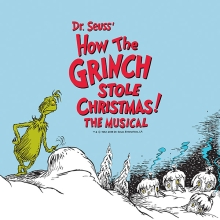Filichia Features: We’ve Got Oliver!
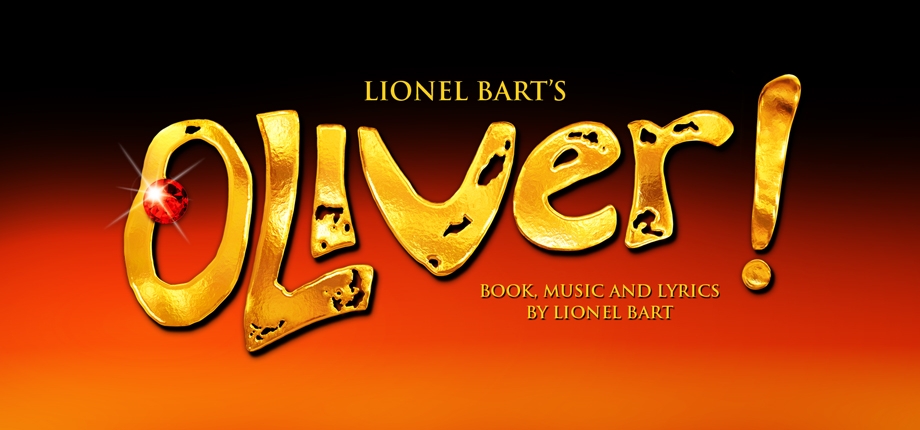
Filichia Features: We’ve Got Oliver!
Around this time 56 years ago, long-time London theater observers were very skeptical about a new musical that was slated to open at the end of June.
A musical version of Charles Dickens’ Oliver Twist, are you kidding me? In 1960, London was home-growing musicals with such light-as-air titles as Joie De Vivre, Pretty as Paint and Follow That Girl. And although Oliver! did have a happy ending, would audiences sit still until it arrived?
No, there couldn’t possibly be any music in the life of an orphan whose self-esteem just had to sink after he’d essentially flunked out of the orphanage. Poor Oliver was then indentured to terrible bosses from whom he was able to escape. But now he was homeless -- until he fell in with The Artful Dodger and other evil companions. Under the thrall of their master Fagin, they had to steal to earn their keep. As the first act ended, first-time criminal Oliver – who didn’t show a native affinity for pickpocketing – was caught mid-theft and arrested for robbery.
To be fair, songwriter Lionel Bart was not an unknown quantity. He’d had a number of pop hits and in the West End and had had two big stage successes. But Bart had never before tried the triple-task of book, music and lyrics. Few who’d ever attempted to accomplish all three jobs had ever succeeded.
Oliver! had its tryout in Wimbledon, best known for its annual tennis competitions. Chances are that even before audiences heard Oliver sing “Where Is Love?” they assumed that the type of love this musical would get would be analogous to “love” in tennis matches.
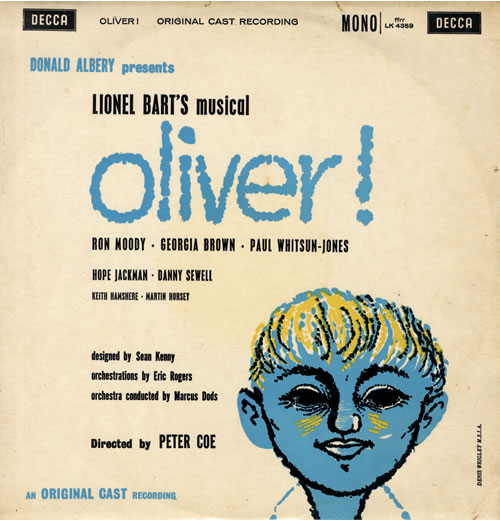
An image of the Original London Cast Recording of Oliver! (©Decca Records)
The number of seats occupied at any Wimbledon performance of Oliver! was akin to the number of cents Rose’s father in Gypsy plans to deny her. During that tryout, only one critic out of the many who attended was remotely enthusiastic. Bart admitted that “Word wasn’t that great” and producer Donald Albery flatly stated “We have a flop.”
What they really had was a bomb – but in England, unlike here, “bomb” is the word used for “smash hit.” Yes, during the first 20 minutes at the June 30, 1960 debut at the New Theatre, first-nighters didn’t use their hands to applaud, but to wave away the heat, for London was unusually hot that night. But as soon as The Artful Dodger appeared and sang “Consider Yourself,” the theatergoers who’d been sitting on their hands sat up with interest. They began to consider themselves very lucky to be on the ground floor of a soon-to-be classic musical.
Broadway’s premier producer David Merrick took notice and brought Oliver! to our Imperial Theatre in 1963, where it became one of Broadway’s 25 longest-running book musicals. No, it didn’t win the Tony as Best Musical – few of Merrick’s musical hits ever did, which may have had something to do with how many colleagues hated, feared and envied him – but Bart won for Best Score. Hollywood appreciated the property even more when it awarded a very faithful film adaptation the Oscar as Best Motion Picture of 1968.
A young teenager named Cameron Mackintosh adored the show. He proved his devotion years later by producing a revival, and, over the years, even more revivals. Now Mackintosh, who recently became a part-owner of Music Theatre International, has made the newest version of Oliver!available for licensing through MTI.
I’ve seen seven productions of Oliver!– including Merrick’s original – and the one that impressed me the most was the one at Trinity Repertory Company in Providence, Rhode Island in 2014. Co-directors Richard and Sharon Jenkins in conjunction with actor Timothy John Smith came up with the most amazing take on Bill Sikes that I’d ever seen.
Sikes, you may recall from your high school English classes, is one of Fagin’s “graduates.” Now grown and on his own, he’s become a real 19th century melodramatic, alcoholic and sadistic villain. When he enters early in Act Two, he sings “My Name,” his manifesto of terror, in which he establishes just who he is: “Strong men tremble when they hear it! They've got cause enough to fear it! It's much blacker than they smear it! Nobody mentions my name!”
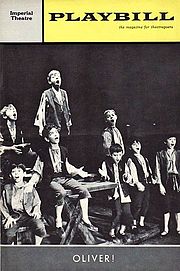
Playbill cover from the 1963 Original Broadway Production.
Indeed, anyone who says anything that might incriminate Bill Sikes does so at his own peril. Yes, Smith had an enormous horizontal scar across his forehead and an even longer vertical one on his cheek, but the implication of those was still “You should have seen the other guy – but now you can’t because he’s six feet under.”
No, you wouldn’t treat a dog the way that Bill treats people – or his own dog, for that matter. At one point in the novel, Bill beats his pet terrier so severely that the poor thing requires stitches.
That, however, is nothing compared to what Bill does to his ostensible girlfriend Nancy. When he comes near her, we’re never certain if this volatile psychopath is going to kiss her or hit her. Much later, when Nancy tries to do the right thing – and plans to give His Name to the authorities -- Bill immediately forgets whatever “romantic” relationship they had. He thinks nothing at all of murdering her, for self-preservation is always first and foremost.
But the Jenkinses and Smith took as their cue two lines in the last section of “My Name”: “Once bad -- what's the good of turning? In hell, I'll be there-a-burning.” This production showed a Bill Sikes who positively hated himself and couldn’t stand what he’d become. Through Smith, we saw a man who we could imagine spending a considerable amount of time wishing that he could have turned out better. It’s as if he’d heard Micki Grant’s marvelous song in Working – “If I could’ve been what I could’ve been, I could’ve been something.”
Alas, getting into Fagin’s gang during his childhood set him on a very wrong path; and a life of crime was all he was trained to experience. In the real and respectable world, changing careers isn’t easy; in the underworld – ask any Mafioso -- it’s considerably harder.
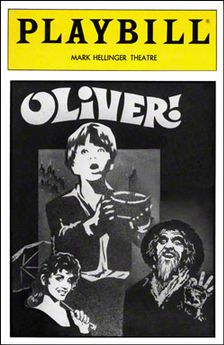
Playbill cover from the1984 Revival.
Usually an actor playing Bill delivers “My Name” in snarly fashion, the ultimate bully anthem. Not Smith. He almost sang it in a perfunctory manner with a subtext of “This is what you expect of me, so this is what I have to give you, even though I don’t really feel this way. But if I changed now, you’d be saying ‘Wow, what happened to Bill?’ I also have to worry that you’d think I’d gone soft, and I might be even more unhappy if that were the case. So the devil I know – me -- is better than the angel I might have been or even might be.”
Handling the character of Bill in this way also helps us to understand Nancy’s feelings for him. Here in Providence, Rachael Warren saw what we saw: a tortured soul who was trapped in his “occupation” and desperately wished he could have entered another. As a result, she pitied him and took up with him to bring a little joy into his life.
Alas, the plot demands that he not bring any joy to her. The most amazing part of Smith’s astonishing performance occurred when he strangled Nancy to death – for he made it seem as if Bill were killing himself and not her. His demeanor after the murder was one of “I don’t have to wait to die to go to hell; I’m there already every day of my life.” So for the rest of the show until Bill was killed, Smith was slower and more lead-footed, as if hoping to get caught so that his miserable life would be over. How much more potent all this was compared to the one-dimensional portrayals of Bill we’ve always seen.
Onto a more lighthearted matter: Barry Humphries – who is much better known as Dame Edna Everage – was originally Mr. Sowerberry, the Undertaker, in both the original London and Broadway productions of Oliver! When Dame Edna came to Broadway in 1999, I knew this fact before I set out to interview him.
Excuse me – interview HER. That’s part of the deal you make when you chat with Dame Edna. You may NEVER say “Mr. Humphries” although that’s who’s underneath the baubled, bangled and beaded dress and the wig that sports a color that every teen with a safety pin through his nose and tattoo on his forehead would covet. The only name you can use is “Dame Edna.” In other words, when you’re interviewing HER, there is no such person as HE.
Still, I wasn’t above asking in a most reverential tone, “Dame Edna, have you ever thought of playing the great musical comedy roles? Mame? Dolly?” She started to answer, but I delivered my zinger: “The Undertaker in Oliver!!?”
There was a sudden silence. Then I got an intense glare and a low-voiced response I can still see and hear these 15-plus years later: “The Undertaker in Oliver!” she said, “is NOT a great role …”
Maybe not – but Bill Sikes can be, as Timothy John Smith, Richard and Sharon Jenkins proved beyond measure.
You may e-mail Peter at pfilichia@aol.com. Check out his weekly column each Monday at www.broadwayselect.com, Tuesday at www.masterworksbroadway.com and Friday at www.kritzerland.com. His book The Great Parade: Broadway’s Astonishing, Never-To-Be Forgotten 1963-1964 Season is now available at www.amazon.com.























